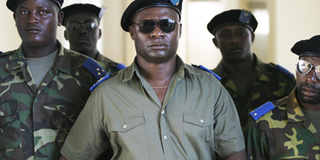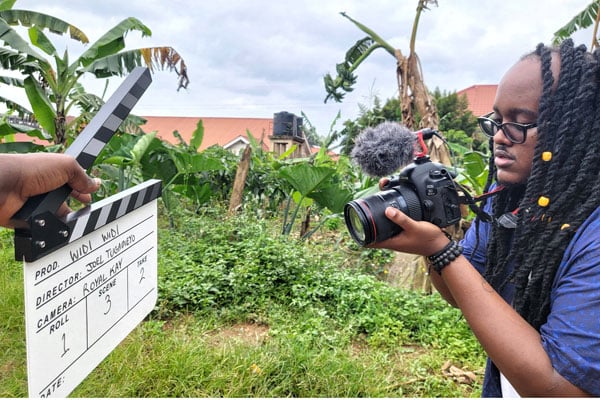Prime
The making of a movie-star - Abby Mukiibi

What you need to know:
While growing up, he had the dream to act both in theatre and film. But back then, before he became movie- star-famous, his father Hajji Elias Ssimwogerere was opposed to his career.
He is one of the few Ugandan actors who have made it on the international scene. Despite major appearances in Sometimes in April, Last King of Scotland and Silent Army, he has the humility to say he is not the best actor, but just priviliged, writes Edwin Nuwagaba.
I have been waiting for Abby Mukiibi for 10 minutes now, past the time we were meant to meet. Finally, he appears at the entrance of the Coffee Terrace at Grand Imperial Hotel, dressed in a brown un-tucked shirt, a gold plated bracelet on his left arm and his cologne can be smelt from a distance.
Clean shaven, his physique is that of a healthy man; still strong and enduring. He tells me that we cannot take long with the interview because he has a busy schedule. He has to do a lot of work at CBS FM where he is the programmes manager in anticipation that President Museveni will allow the radio to re-open. The radio, it was alleged, was fuelling sectarianism before it was shut down.
Like many people who are passionate about the arts, Mukiibi’s passion for acting started when he was still a little boy. While growing up, he had the dream to act both in theatre and film. But back then, before he became movie- star-famous, his father Hajji Elias Ssimwogerere was opposed to his career. He wanted him to become an engineer just like him or choose any other conventional profession. And to distract him from his acting ambitions, he had to fly him out of the country to the US where he stayed for a year. But Mukiibi’s mother had always believed in his aspirations, to the extent that when he sneaked back into the country to pursue Music, Dance and Drama at Makerere University, for the first three months it was only her that knew about it. This lack of appreciation for his acting ambitions from his father came to an end before he passed away.
“My dad told me that when I was young, there were two things I told him I would do. He said I told him I would build a storied house and I would be a film actor. When my first movie came out, he was happy for me, and it was then for the first time, that he let me be who I wanted to be,” he recalls.
Mukiibi’s movie debut was way back in 1997 when he acted in Fires of Hope as Kabaka Mwanga. The movie is about Uganda Martyrs and how they were persecuted by Kabaka Mwanga. Whereas it did not sell locally, it was distributed widely in Europe and other countries across Africa. It was directed by an Irish film director, Fhil Molali. Michael Wayuyo and Charles Mulekwa invited him, Mukiibi recalls. And since then, he has not looked back.
Lady luck came knocking at his door when he was offered a role as Colonel Bagosora in Sometimes in April. The movie depicts the Rwanda genocide and while there have been a number of movies about the subject, this one concentrated around how it was like for those trying to survive outside Hotel Des Mille Collines- the people who had no place else to go, hoping to find some sanctuary in churches or places of public refuge.
This is the movie where he met professionals. Raoul Peck, the movie director had quite a big impact on his acting skills and it has lasted to date.Raoul is a film maker based in Haiti. He wrote and drirected movies like Lumumba, Death of a Prophet and Man by the Shore. He was also briefly in the 1990s, Haiti’s Minister for Culture.
“He was so tactful in making you do so many things,” he says. Mukiibi recalls an incident in one of the scenes when one of the actors refused to respond to him the way he should have, because apparently- this actor did not think Mukiibi was a good actor.
“The director whispered some words to me, which I told the other actor, and all of a sudden, he (the actor) came and hit me. That is what the director wanted,” he recalls. When I ask him about The Last King of Scotland, where he acted as Masanga, another big movie that heightened his profile, he is all praises for Forest Whitaker. “Forest was a very big inspiration. First, I felt intimidated by the person I was going to act with, but he was so open. We used to go into his room at Kabira Country Club and we would drive to town. So we spent a lot of time together. He has a very good heart,” Mukiibi enthuses. Whitake always maintained that if they (Ugandan actors) didn’t help him, he would not have been able to do his role neither would they have done theirs had he not helped them.
For Mukiibi to come this far, it is a result of hard work, rehearsals and reading but the international directors have been more than helpful. He cites Jean Van De Velde, who directed him in the recent movie Silent Army, as one of those people who have helped shape his career. “He would make you do the things you were not aware you were doing. He would ask you for your own interpretation of a character then he would say, ‘Let’s do it.’ After you have done it, he would say, ‘Can we do it this way?’ On the 10th take, you would realise that you had actually done what he wanted,” he says.
When he went to do the role of Oboke, the rebel leader in Silent Army, he interpreted the character of Oboke as an aggressive, tough and uncompromising monster. But Jean told him he wanted him to be very charming, so caring and so deadly a man that actually laughs while he kills.
Mukiibi adapted the role perfectly; he doesn’t kill in this movie but he uses the child soldiers to kill. He can laugh and smile but when it is time to kill; he puts on an unfriendly face. It is him and the abducted child, Abu (Andrew Kintu) that the movie is centred on.

Today, Mukiibi is one of the few Ugandan actors who have made it on the international scene. And one wonders whether it is not to his disadvantage when he acts in local, half directed and half produced amateur films. He admits it does, though he thinks he is doing a service to the industry. “Many people complain about it, but I feel like I am doing a noble duty to the industry. I believe for this industry to evolve, we need to join hands.” So what is it like acting in the big movies compared to the local ones?
“With the big movies, they pamper you and they pay you handsomely because they are going to use you, but here you even have to look for your own costume,” he discloses. But one thing he says he will not compromise on is quality. If the movie lacks the basics of film, he is sorry but he will not act. No wonder, Mukiibi is known as a perfectionist.
While securing an agent (Hope Azeda from Kigali who secured him the roles in Sometimes in April and Silent Army) has helped him advance his career, in the eyes of some, it has made him a show-off. This is because when local producers contact him to take up a role in a movie, he sends them to his agent, who charges them highly. This however does not apply to the likes of Mariam Ndagire, John Segawa and Patriko Mujuuka whom he has had to stress to the agent, he is only helping to promote their movies and they don’t even pay him.
Most people think that Mukiibi is a better actor in film, than he is on the stage but he thinks he has been able to balance the two. “I believe one role has catapulted me into the other. Stage threw me there, and film has perfected me,” he says. So is he about to quit theatre for film? “I am still trying to balance both. Time will tell because our local audience has always been there for us in bad and good times,” he says.
The other person who has been there for him is his wife, Stella Mukiibi.
While he is a Muslim, he does not buy so much into the idea of getting his wife to become a Muslim. With her, he has been able to bring into the world four children; three boys and one girl. He fell in love with Stella at first sight, then, as a first year student of Social Works and Social Administration at Makerere University.
Mukiibi is the third born in a family of four boys and three girls. He liked History and English and hated Maths. But he was a good footballer and athlete in all the schools he attended: Victoria Nile Primary School, Kako Primary School, Makerere College School and Caltec Academy. He believes that the local industry has got potential to make it, but he wonders why the government does not help. Earlier this year, while at the Cannes Film Festival, he learnt from his Nigerian colleagues that their film industry was thriving because the government was largely involved and supportive.
He thinks also that, the other problem this industry faces, are the pretenders who shoot amateur videos and flood them on the market selling them as films. “I think now is the stage where registration and regulation should come in, so we know who is doing what,” he says in rather sad tone. Mukiibi’s dream is to start up a film village just like Disney World- where everything will be about film. Despite the praises he has got, Mukiibi says that he is not the best. “There are many beautiful actors, I don’t think I am the best, I am just privileged,” he says.




